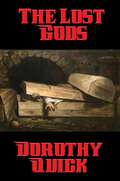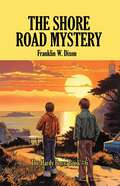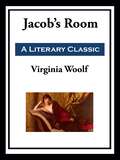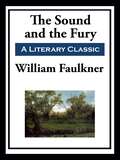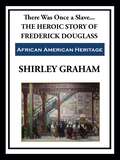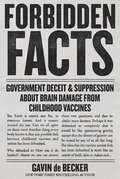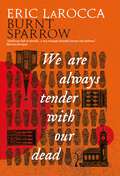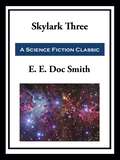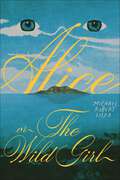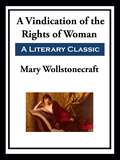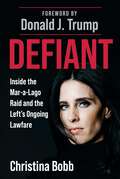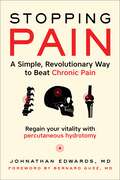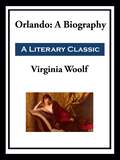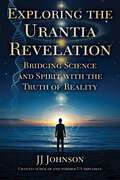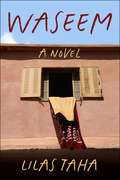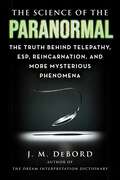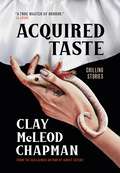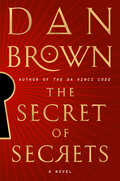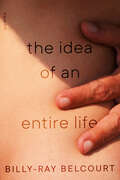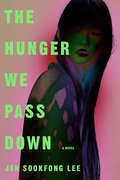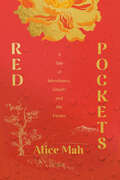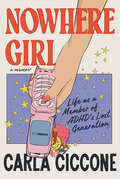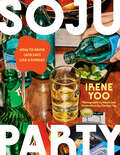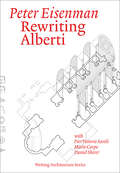- Table View
- List View
The Lost Gods
by Dorothy QuickFrom the backwaters of the Universe came two Beings-radiant, terrible-to challenge the love of a mortal man and woman! Dorothy Quick was a regular contributor to Weird Tales. She wrote more than a dozen books but was best known for her non-fiction book Mark Twain and Me which recounted her childhood friendship with Twain.poignant and powerful reflection of the human experience.
The Shore Road
by Franklin W. DixonEmbark on a thrilling journey with the Hardy Boys as they unravel the enigma shrouding The Shore Road Mystery. Nestled within the quaint coastal town of Bayport, danger lurks beneath the serene waves and picturesque vistas. When an eerie disappearance rocks the community, the intrepid brothers, Frank and Joe Hardy, leap into action. As they navigate the labyrinthine roads and shadowy alleys, the Hardy Boys plunge headfirst into a web of deception and intrigue. Each clue unearthed leads them deeper into the heart of the mystery, where secrets whisper on the salty breeze and every step forward brings them closer to peril. With their trademark ingenuity and unwavering determination, Frank and Joe race against time to solve the puzzle before it's too late. But as the stakes escalate and danger looms ominously, the brothers must rely on their wits and each other to uncover the truth hidden amidst the crashing waves. Join the Hardy Boys on a pulse-pounding adventure that will keep you guessing until the very last page. The Shore Road Mystery is a gripping tale of suspense, friendship, and the unyielding pursuit of justice in the face of adversity.
Jacob’s Room
by Virginia WoolfIn Virginia Woolf's Jacob's Room, the titular character's room is a vivid reflection of his inner life and the complexities of his character. The space is imbued with a sense of intimacy and chaos, where scattered books and sketches reveal Jacob's intellectual pursuits and artistic inclinations. Sunlight filters through the windows, casting playful shadows that dance across the walls, hinting at the fleeting nature of time and memory. The room is adorned with personal artifacts-a well-worn chair, a half-open drawer spilling over with letters and mementos, and a desk that bears the marks of creativity and contemplation. Each object tells a story, embodying Jacob's aspirations, relationships, and the weight of his experiences. Woolf captures the essence of a young man caught between the innocence of youth and the harsh realities of adulthood, making the room not just a physical space, but a poignant symbol of his journey through life. Through meticulous detail and evocative prose, Woolf transforms Jacob's room into a microcosm of his existence, inviting readers to explore the depths of his thoughts and the fleeting moments that define him. The atmosphere is both serene and charged, a testament to the beauty and tragedy of human experience. thoughts and emotions. Night and Day is a profound meditation on the nature of relationships, the pursuit of individuality, and the interplay between night and day as metaphors for the dualities of life.
The Sound and the Fury
by William FaulknerWilliam Faulkner's The Sound and the Fury is a masterpiece of modernist literature, renowned for its complexity and emotional depth. Set in the fictional Yoknapatawpha County, Mississippi, the novel delves into the turbulent world of the Compson family, unraveling their fall from grace and the impact of time on memory, identity, and loss. What makes this work extraordinary is Faulkner's innovative narrative structure, which defies traditional storytelling. The novel is divided into four distinct sections, each told from the perspective of different characters-Benjy, a mentally disabled man; Quentin, a troubled and introspective student; Jason, an embittered and cynical brother; and the omniscient third-person narrator who attempts to tie the story together. Through fragmented time shifts, unreliable perceptions, and streams of consciousness, Faulkner masterfully portrays the internal struggles of each character, presenting a haunting exploration of the human condition. The Sound and the Fury weaves themes of disintegration-of family, tradition, and the Southern way of life-amidst the emotional chaos of love, betrayal, and memory. With its intricate narrative style and profound emotional resonance, it challenges readers to interpret its layers of meaning, ultimately offering a tragic and poignant vision of the past's irreversible influence on the present. It's a novel that demands engagement, reflection, and, ultimately, deep admiration for Faulkner's daring artistry.
There Was Once a Slave
by Shirley GrahamBorn into chains. Driven by truth. Destined for freedom. Before he was a legend, he was a boy—enslaved, beaten, denied the right to read, and told he was nothing. But Frederick Douglass refused to be broken. Armed only with fierce intelligence, relentless courage, and the fire of justice burning in his heart, he taught himself to read and write in secret—igniting a revolution that would change not just his life, but the soul of a nation. There Was Once a Slave... brings to life the astonishing journey of Frederick Douglass, from the brutal fields of Maryland to the thundering podiums of abolitionist rallies. It is a story of struggle and triumph, of words used as weapons, and of a man who rose from slavery to become a voice for liberty, dignity, and human rights. A gripping, inspiring portrait of one of history&’s greatest self-made heroes. His fight was for freedom—not just his own, but for all.
Forbidden Facts: Government Deceit & Suppression About Brain Damage from Childhood Vaccines
by Gavin de BeckerHave Government agencies and big corporations ever created and promoted outright lies and cover-ups?Of course they have. When they do it together, that is the definition of conspiracy.Internationally recognized criminologist and bestselling author of The Gift of Fear, Gavin de Becker, investigates how the Government &‘debunks&’ inconvenient and unwanted truths. This story of true crime includes bogus research, bribes, compromised experts, paid conspirators, destruction of evidence, and massive publicity campaigns to discredit people and truths that don&’t fit official wishes.Readers are provided real-time access to original source material that clearly details how Government agencies and Big Pharma have routinely conspired to deceive the public on matters of profound importance.
We Are Always Tender with Our Dead: (Burnt Sparrow, 1) (Burnt Sparrow)
by Eric LaRoccaMichael McDowell&’s Blackwater meets Clive Barker&’s The Great and Secret Show in the disturbing first installment of a new trilogy of intense, visceral, beautifully written queer horror set in a small New England town.A chilling supernatural tale of transgressive literary horror from the Bram Stoker Award® finalist and Splatterpunk Award-winning author of Things Have Gotten Worse Since We Last Spoke.The lives of those residing in the isolated town of Burnt Sparrow, New Hampshire, are forever altered after three faceless entities arrive on Christmas morning to perform a brutal act of violence—a senseless tragedy that can never be undone. While the townspeople grieve their losses and grapple with the aftermath of the attack, a young teenage boy named Rupert Cromwell is forced to confront the painful realities of his family situation. Once relationships become intertwined and more carnage ensues as a result of the massacre, the town residents quickly learn that true retribution is futile, cruelty is earned, and certain thresholds must never be crossed no matter what.Engrossing, atmospheric, and unsettling, this is a devastating story of a small New England community rocked by an unforgivable act of violence. Writing with visceral intensity and profound eloquence, LaRocca journeys deep into the dark heart of Burnt Sparrow, leaving you chilled to the bone and wanting more.
Skylark Three
by E. E. SmithSkylark Three by E. E. Doc Smith is a riveting continuation of the epic Skylark series that will transport readers to new realms of wonder and excitement. Join our intrepid protagonist as he embarks on a thrilling interstellar adventure, encountering strange alien civilizations, mind-bending technologies, and heart-pounding action along the way. With its blend of high-octane space battles, intricate world-building, and thought-provoking themes, Skylark Three is a captivating journey into the unknown that will leave readers on the edge of their seats. Prepare to be swept away by the sheer imagination and storytelling prowess of E. E. Doc Smith in this unforgettable sci-fi masterpiece.
Alice, or The Wild Girl
by Michael Robert LiskaIn 1856, Lieutenant Henry Aaron Bird makes a startling discovery: a speechless, shipwrecked young girl, living a feral existence on a remote Pacific island. When he exhibits her as a &“wild girl&” in the chaotic sprawl of early San Francisco, this golden-haired child without a past will be seen by the populace as a scientific curiosity, a titillating image of female savagery, or, for many, a symbol of the unspoiled body of that young country. For Bird, she is a fragile ward in need of protection, whom he keeps drugged and confined when not using her to further his reputation. But Alice will rebel against Bird&’s control, and set herself adrift once more in the surreal landscape of 19th century America—a place no less foreign to her than her own troubled past—where she&’ll discover that the freedom she desires may have always been an illusion. Alice, or The Wild Girl takes the reader on a voyage from French Polynesia to the terminus of the American frontier, as it charts the unlikely bond that develops between an aging US naval commander and the lost, damaged girl he attempts to &“civilize&” as a way of alleviating his own loneliness and ennui. Steeped in period detail and layered with fascinating thematic threads, Michael Robert Liska's bold tale examines existential questions about the nature of history, time, and identity, in a vanished America that is at once alien and strikingly like our own.
All Quiet on the Western Front
by Erich Maria RemarqueAll Quiet on the Western Front by Erich Maria Remarque is a harrowing and deeply human exploration of the brutal realities of war. Set against the backdrop of World War I, the novel follows Paul Bäumer, a young German soldier who, along with his comrades, is thrust into the violent chaos of the Western Front. Through Paul's eyes, Remarque vividly depicts the horrors of combat, the emotional toll of constant death, and the disillusionment that war brings to those who fight it. As the soldiers endure relentless bombardments, gas attacks, and the loss of friends, they grapple with a profound sense of alienation and despair. What begins as a patriotic call to arms for Paul and his peers quickly devolves into a desperate struggle for survival. The bond between soldiers becomes their only solace in an unforgiving world, and as the war drags on, the line between life and death blurs. With stark realism, Remarque captures the profound psychological trauma of war, stripping away any romanticism and exposing its dehumanizing effects. All Quiet on the Western Front is a timeless anti-war masterpiece that examines the deep emotional and physical scars left on those who are caught in the horrors of conflict. It&’s a poignant meditation on loss, the fragility of youth, and the tragic futility of war that will resonate with readers long after the final page is turned.
A Vindication of the Rights of Woman
by Mary WollstoneA Vindication of the Rights of Woman: With Strictures on Political and Moral Subjects, authored by Mary Wollstonecraft stands as a pioneering work in feminist philosophy and advocacy. In this groundbreaking text, Wollstonecraft passionately argues for the education and empowerment of women, challenging the societal norms that confine them to subservient roles. Through eloquent prose and incisive reasoning, she critiques the prevailing attitudes of her time, asserting that women are not inherently inferior to men but are instead denied the opportunities for intellectual and moral development. Wollstonecraft's work is not merely a call for women's rights; it is a profound exploration of the interconnectedness of gender, politics, and morality. She emphasizes the importance of reason and virtue, advocating for a society where women can contribute meaningfully to the public sphere. By addressing issues such as marriage, education, and the nature of virtue, Wollstonecraft lays the groundwork for future feminist thought, making her arguments both timeless and relevant. This text invites readers to reflect on the fundamental principles of equality and justice, urging a reevaluation of the roles assigned to women in society. A Vindication of the Rights of Woman remains a vital and inspiring manifesto, encouraging generations to strive for a more equitable world.
Defiant: Inside the Mar-a-Lago Raid and the Left's Ongoing Lawfare
by Christina BobbA gripping first-hand exposé of the coordinated legal and political attacks against Donald Trump and his allies, revealing the deep-state efforts to undermine democracy.The 2024 election was a miracle comeback--Donald Trump, against all odds, reclaimed the White House after facing an unprecedented barrage of legal attacks and government harassment. But as Christina Bobb reveals in Defiant, the battle for America&’s future was far from over.Bobb's shocking, personal account takes readers behind the scenes of the infamous Mar-a-Lago raid, exposing unprecedented abuses of power: FBI agents breaking locks while offered keys, denying Trump&’s representatives access, and seizing privileged documents under a shroud of secrecy. She documents the relentless campaign of indictments, subpoenas, and media manipulation designed to destroy Trump and silence his supporters.But the lawfare didn&’t end at the ballot box. As Trump&’s new administration moved to restore the rule of law, blue-state officials, federal agencies, and activist judges openly defied his orders--launching lawsuits, blocking pardons, and vowing to undermine his agenda at every turn. Bobb uncovers the coordinated efforts to weaponize the justice system, from the disbarment of constitutional lawyers to the criminalization of alternate electors.Defiant is a bombshell exposé of the lengths the Left will go to maintain power--and a call to action for Americans who refuse to let their country be lost to tyranny. With exclusive details and unflinching courage, Christina Bobb sounds the alarm. The final test for America is here. Will we restore justice, or will we lose our republic forever?
Stopping Pain: A Simple, Revolutionary Way to Beat Chronic Pain
by Johnathan EdwardsBe free of chronic pain and live a better life.Stopping Pain introduces those who suffer from chronic pain to an overlooked but safe and effective alternative to expensive and addictive pain medications. Percutaneous hydrotomy, a revolutionary medical technique developed over 30 years ago in France and used safely in Europe since, is a regenerative treatment that employs physiologic saline, vitamins, minerals, and carefully selected medications to alleviate chronic pain and enhance overall bodily function. Stopping Pain explains this revolutionary approach and how you can use it successfully. You will learn: The principles and methods that make percutaneous hydrotomy an effective solution for chronic pain. Why percutaneous hydrotomy offers a new ray of hope for patients grappling with chronic diseases, providing them with the potential for a pain-free and fulfilling life. Many compelling narratives of individuals who, despite years of conventional medication, found relief and regained their zest for life through percutaneous hydrotomy. How amateur and professional athletes, including NFL players, MMA athletes, motocross racers, cyclists, and professional tennis players have overcame pain and enhanced performance through percutaneous hydrotomy. The best ways to discuss this regenerative approach with your doctors, and where to find doctors to give you this groundbreaking treatment. Stopping Pain is your guide to breaking free from the shackles of chronic pain and embracing a future filled with vitality and well-being. Don't let pain dictate your life any longer. Discover the transformative power of percutaneous hydrotomy.
Orlando: A Biography
by Virginia WoolfVirginia Woolf's Orlando is a groundbreaking novel that transcends the boundaries of time, gender, and identity. Spanning over three centuries, it follows the life of its titular character, Orlando, who begins as a young nobleman in the Elizabethan era and undergoes a remarkable transformation into a woman in the 20th century. Woolf masterfully explores themes of fluidity in gender and the nature of self, challenging societal norms and expectations. Through a rich tapestry of historical and literary references, Orlando invites readers to reflect on the complexities of identity and the passage of time, all while maintaining a playful and innovative narrative style. This novel not only serves as a profound commentary on the roles of gender and sexuality but also celebrates the liberating power of creativity and self-expression.
Exploring the Urantia Revelation: Bridging Science and Spirit with the Truth of Reality
by JJ JohnsonBring science and religion together through The Urantia Book's spiritual truths.For fans of Graham Hancock, Joe Rogan's thought-provoking guests, and anyone trying to bridge the gap between science and religion, this groundbreaking exploration reveals how The Urantia Book anticipated major scientific discoveries decades before they occurred—offering compelling evidence of its extraordinary cosmic origins.JJ Johnson, ambassador for cosmic citizenship and 50-year student of the Urantia revelation, delivers the definitive guide to understanding how this remarkable text:Anticipates Science: Documents how The Urantia Book described the Precambrian supercontinent, Adam and Eve's genetic timeline, and cosmic structures before scientists confirmed these discoveriesIlluminates History: Reveals hidden truths about Göbekli Tepe, ancient civilizations, and humanity's spiritual development that archaeology is only now beginning to uncoverTransforms Lives: Shows how The Urantia Book's integration of scientific precision with spiritual insight creates a coherent framework that satisfies both intellect and soulCompletes Jesus' Story: Presents the most comprehensive account of Jesus' complete life—including his childhood, adolescence, and "missing years"—revealing the man behind the missionDrawing on his personal spiritual awakening and global experiences as a U.S. Foreign Service Specialist, Johnson provides a compelling case for the COSAR Principle—the Coordination of Science and Religion—demonstrating how The Urantia Book's remarkable foresight proves its validity as a divine revelation.Whether you're transitioning from traditional religion to a more cosmic understanding, feeling spiritually adrift in a materialistic world, or seeking a framework that honors both scientific discovery and spiritual truth, Exploring the Urantia Revelation gives you everything needed to grasp reality's deeper dimensions.
Waseem: A Novel
by Lilas TahaThe unforgettable, heartbreaking story of a doomed love and a young man&’s education in hope.In the crowded streets of a Palestinian refugee camp in Lebanon, Waseem has learned to navigate life with quiet resilience. Born with a disability that leaves him largely unable to speak or walk, Waseem&’s world is shaped by the small, intimate details of camp life.For years, Waseem has shared a deep, unspoken bond with Ameena, his best friend and the girl he has silently loved from afar. Ameena, a fierce and compassionate spirit, has always been there for Waseem, supporting him through every challenge. The friendship is both fueled and challenged by their secret ambition––to travel to Palestine, their beloved but unreachable ancestral home.Waseem is in turn a tear-wrenching and hilarious journey of friendship, love, and exile. It explores the intersections of physical and emotional healing, and the resilience of the human spirit in the face of seemingly insurmountable odds. Waseem's story is one of determination and transformation—a testament to the power of love and the unbreakable connection to one's roots, no matter how distant they may seem.
The Science of the Paranormal: The Truth Behind Telepathy, ESP, Reincarnation, and More Mysterious Phenomena (The Science of)
by J. M. DeBordDiscover the truth behind ESP, paranormal powers, and psychic abilities—the perfect gift for curious minds and bold scientists alike. Some paranormal phenomena and powers of the mind are real, but mainstream science dismisses it all as fantasy. The Science of the Paranormal looks toward the overwhelming evidence that something weird and wild lies behind our everyday reality. Credible witnesses have seen paranormal activity with their own eyes. Scientists have studied it in their labs. And everyday we see depictions of it in popular media like Stranger Things and X-Men. Separate fact from fiction in this book and get answers to questions like: Can objects be moved with psychokinesis? Is the future foreseeable? Can we communicate telepathically? What does science say about ESP? Where is the evidence for reincarnation and spirits? And much more! Explore the fascinating discoveries behind the paranormal with The Science of the Paranormal.
Acquired Taste
by Clay McLeod ChapmanA startling, witty and downright terrifying collection of 25 short stories from the "21st century's Richard Matheson" (Richard Chizmar, Chasing the Boogeyman.) Perfect for fans of Paul Tremblay, Rachel Harrison and Eric LaRocca.They're feeding on you too.A father returns from serving in Vietnam with a strange and terrifying addiction; a man removes something horrifying from his fireplace, and becomes desperate to return it; and a right-wing news channel has its hooks in people in more ways than one. From department store Santas to ghost boyfriends and salamander-worshipping nuns; from the claustrophobia of the Covid-19 pandemic to small-town Chesapeake USA, Clay McLeod Chapman takes universal fears of parenthood, addiction and political divisions and makes them uniquely his own. Packed full of humanity, humour and above all, relentless creeping dread, Acquired Taste is a timely descent into the mind of one of modern horror's finest authors.
The Secret of Secrets: A Novel (Robert Langdon)
by Dan BrownThe world&’s most celebrated thriller writer and author of The Da Vinci Code returns with his most stunning novel yet—a propulsive, twisty, thought-provoking masterpiece that will entertain readers as only Dan Brown can do.Robert Langdon, esteemed professor of symbology, travels to Prague to attend a groundbreaking lecture by Katherine Solomon—a prominent noetic scientist with whom he has recently begun a relationship. Katherine is on the verge of publishing an explosive book that contains startling discoveries about the nature of human consciousness and threatens to disrupt centuries of established belief. But a brutal murder catapults the trip into chaos, and Katherine suddenly disappears along with her manuscript. Langdon finds himself targeted by a powerful organization and hunted by a chilling assailant sprung from Prague&’s most ancient mythology. As the plot expands into London and New York, Langdon desperately searches for Katherine . . . and for answers. In a thrilling race through the dual worlds of futuristic science and mystical lore, he uncovers a shocking truth about a secret project that will forever change the way we think about the human mind.
The Idea of An Entire Life: Poems
by Billy-Ray BelcourtDaring and vulnerable, this is the highly anticipated new collection from Griffin Poetry Prize winner Billy-Ray Belcourt.In The Idea of An Entire Life, Belcourt delivers an intimate examination of twenty-first-century anguish, love, queerness, and political possibility. Through lyric verse, sonnets, fieldnotes, and fragments, the poems, sometimes heart-breaking, sometimes slyly humorous, are always finely crafted, putting to use the autobiographical and philosophical style that has come to define Belcourt&’s body of work. By its close, the collection makes the urgent argument that we are each our own little statues of grief and awe.
The Hunger We Pass Down: A Novel
by Jen Sookfong LeeFrom the bestselling author of Superfan comes a haunting novel about the demons passed down through five generations of women in a Chinese Canadian family, and what it might take for them to finally break free of the past.Single mother Alice Chow is drowning. With a booming online business, a resentful teenage daughter, a screen-obsessed son, and a secret boyfriend, she can never get everything done in a day. So it&’s a relief when Alice wakes up one morning to find the counters are clear, the kids&’ rooms are tidy, and orders are neatly packed and labelled. But she doesn&’t remember staying up late to take care of things. As the strange pattern continues, she realizes someone—or something—has been doing her chores for her. Alice knows she should feel uneasy, but the extra time lets her connect with her children and with her hard-edged mother, who has started to share shocking stories from their family history—beginning with the horrors that befell her great-grandmother, who was imprisoned as a comfort woman in Hong Kong during the Second World War. But the family&’s demons—both real and subconscious, old and new—are about to become impossible to ignore. Set against the gleaming backdrop of contemporary Vancouver, The Hunger We Pass Down is a devastating, horror-tinged novel about how unspoken legacies of violence can shape a family. It follows the relentless spectre of intergenerational trauma as it is handed down from mother to daughter, and asks what it might take to break the cycle—heroism, depravity, or both.
Red Pockets: A Tale of Inheritance, Ghosts and the Future
by Alice MahSHORTLISTED FOR THE 2025 WAINWRIGHT PRIZE FOR CONSERVATION WRITINGA poignant personal narrative about family, cultural history, and ecology, and a quest to understand what we owe our ancestors and our descendants from an unforgettable new voice."Part of me knew what the hungry ghosts wanted all along, what they still want. It is not vengeance. No, they want something else, but we refuse to listen. They want us to face up to our broken obligations." Every spring during the Qingming Festival, people return to their home villages in China to sweep the tombs of their ancestors. They make offerings of food and incense to prevent their ancestors from becoming hungry ghosts that could cause misfortune, illnesses and crop failures. Yet for the past century, the tombs of many overseas Chinese have been left unattended because of the ruptures of war and revolution. Following a record year of wildfires, Alice Mah returns to her family's rice village in South China, ninety years after her grandfather's last visit and fifty years after her last relative died in the village. While she finds clan members who still remember her family, there are no tombs left to sweep. Instead, there are incalculable clan debts to be paid. In Red Pockets, Mah chronicles her journey from the rice villages of South China to her home in post-industrial England, through the Chinatowns of Western Canada where she grew up, to the isles and industry of Scotland where she now lives. As years pass and fires rage on, she becomes increasingly troubled by her ancestors' neglected graves. Her research on pollution gives way to growing eco-anxiety, culminating in a crisis of spiritual belief. A haunting blend of memoir, cultural history and environmental exploration, Red Pockets confronts the hungry ghosts of our neglected ancestors, while searching for an acceptable offering. What do we owe to past and future generations? What do we owe to the places that we inhabit?
Nowhere Girl: Life as a Member of ADHD's Lost Generation
by Carla CicconeWhy is a generation of women only now discovering they have ADHD? (Spoiler: misogyny). A writer examines the cost of living with undiagnosed ADHD in a reported memoir about the girls that medical science ignored.When Carla Ciccone is diagnosed with ADHD at thirty-nine—an event brought on by the demands of early motherhood—it flips the script on the story of her life. After years of self-blame and sabotage, it turns out that her most reviled traits aren&’t deep personality flaws, but symptoms of an undiagnosed disorder. And as she goes from being her own biggest hater to something a bit more compassionate, she notices the growing community of women in the same situation.Weaving her personal story into a broader investigation of the rise in ADHD diagnoses, Carla draws on scientific research and expert interviews as she looks back on the classrooms of the 1990s, where &“ADD&” was reserved for hyperactive white boys and the girls learned to mask their differences. She examines the hormonal upheavals of adolescence and their unique effects on neurochemistry and later charts her chaotic entrance into motherhood. She also reflects on the history of women&’s mental healthcare and the pressure put on us to perform our genders in a certain way. Throughout, Carla seeks to understand the ramifications of an ignored mental disorder on an entire generation—the nowhere girls.With humor, depth and detailed reporting, Nowhere Girl explores the cultural impact of ADHD on girls and women and offers a path forward for reclaiming our narratives, forgiving ourselves and parenting our children (and reparenting ourselves) with the softness we didn&’t receive.
Soju Party: How to Drink (and Eat!) Like a Korean: A Cookbook
by Irene YooThe ultimate guide to drinking (and eating) like a Korean! Recipes for cocktails, bomb shots, drinking food, hangover cures, and much more.&“A fun and heartfelt guide to Korean culture through food and drink . . . Irene will have you saying &‘Geonbae!&’ in no time.&” —KRISTEN KISH, host of Top Chef, restaurateur, author&“An apt blueprint of how to navigate this world like a pro while enjoying all the Korean recipes that are indispensable to a night of drinking soju.&” —EDWARD LEE, chef and author of Bourbon LandDrinking is an essential part of Korean culture, one that's guided by a complex web of unspoken rules, deep tradition, and lots and lots of food. With Soju Party, food writer, chef, and co-owner of Brooklyn&’s Orion Bar Irene Yoo has written the book on drinking like a Korean.She introduces the classic Korean alcohols and how Koreans typically like to drink them, sharing recipes for cocktails and tasty anju (drinking foods), including:•The viral Milkis Shot •A heart-stopping Seoul Train•Unique cocktail recipes featuring Korean-inspired riffs and nostalgic twists, like a Jujube Ginseng Negroni and a Banana Milk makgeolli•Simple snacks like salty and sweet Honey-Butter Bar Nuts•Essential comfort food like a savory White Ddukbokki and a super slurpable Kimchi Carbonara•A dedicated party section featuring a large-format Watermelon Soju Hwachae and sweet-and-spicy Chimaek ChickenIn addition to recipes, Soju Party explores the history of Korean drinking, with illustrations explaining proper serving and drinking etiquette, drinking games, food pairings, and more. A book that promises late nights (don&’t worry, there&’s a section on hangovers!), this is a party on the page. Geonbae!
Rewriting Alberti (Writing Architecture)
by Peter EisenmanA fresh, groundbreaking analysis of renowned Renaissance architect Leon Battista Alberti&’s five built works, suggesting a new relationship of form to meaning.Much has been written about Renaissance architect Leon Battista Alberti&’s mantra of part-to-whole as one of the continuing conditions of architecture. While this underlying thesis has often been repeated in the annals of architectural history and theory, architects have rarely questioned the idea. In Rewriting Alberti, architect Peter Eisenman suggests, however, that Alberti provoked a radical discourse beyond the part-to-whole dialogue featured in his Ten Books of Architecture. Eisenman&’s in-depth analysis of Alberti&’s five built works reveals a disjunction between the architect&’s buildings and theoretical writings, suggesting a new relationship of form to meaning based on the fragmentation of homogeneous space.Rewriting Alberti includes contributions by Pier Vittorio Aureli, Mario Carpo, and Daniel Sherer. Carpo, an architectural historian and critic, theorizes that Alberti&’s work initiated an idea of the discipline as a notational system akin to contemporary computational logics. By way of comparison, Sherer, an architectural historian, reconsiders critic Manfredo Tafuri&’s readings of Alberti, and architect and theorist Aureli draws on Alberti to propose another idea of the architectural &“project.&”Here, in one book are four different discourses (and more than 60 drawings) that look back at the origins of architectural signs and semiology and forward to understand the way that history informs architecture today.
